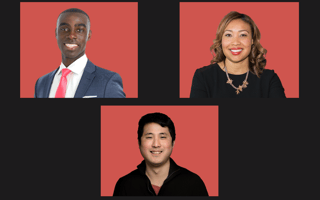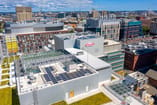
This week, Boston-based investment firm Visible Hands announced that it is launching its first full-time fellowship program to support historically underrepresented tech entrepreneurs. The 14-week program will be held virtually, and is set to begin in mid-September. Applications will be open later this month.
It’s no secret that women and people of color have long been neglected in the startup space, receiving a small fraction of VC funding despite the fact that they make up the majority of the population. Visible Hands’ co-founder and general partner Yasmin Cruz Ferrine says that is what this fellowship is trying to change.
“In 2019, 10,000 millionaires were created in Silicon Valley after the IPOs and acquisitions of technology startups. I want to change the face of those 10,000 millionaires to be more reflective of the U.S. population,” Ferrine told Built In.
For Ferrine, this mission is personal. Before starting Visible Hands, she spent years in asset management, using both VC and philanthropic dollars to help create generational wealth for underrepresented communities. She then linked up with her co-founders, Daniel Acheampong and Justin Kang, who had similar goals.
Now, they’ve launched a new fellowship to build a more diverse population of tech founders from the ground up.
To qualify for the fellowship, founders must be a member of a historically underrepresented community in the tech sector — including women, non-binary, Black, Latinx and Indigenous Americans. Their company also needs to be in the very early stages. That means “pre-idea, pre-team, pre-revenue, and pre-traction,” Ferrine says. The program is fairly sector-agnostic, though the company idea needs to be able to come together within the 14-week span of the program, which means ideas involving the hard sciences or biotech won’t qualify.
Right off the bat each participant will receive a $25,000 investment from Visible Hands. Then, should these founders hit certain benchmarks, they will receive an additional $150,000 as well as connections to other investors and customers.
Besides the money, the fellowship is designed to provide participating founders with a strong network of people. They are all encouraged to work together throughout the program, supporting each other through the “ups and downs of entrepreneurship,” as Ferrine puts it. Founders will also have access to Visible Hands’ ecosystem of more than 500 experts and mentors, who can provide guidance.
“It isn’t easy to be a founder, period. And it certainly isn’t easy to unlock resources, there’s certainly asymmetry. That’s very well documented in the VC funding gap,” Ferrine said. “Growth and change happen when there’s more than one piece. Money is only one piece. So technical assistance, wraparound services and normalizing the achievement of founders that look differently than the founders who we’ve historically seen as a template, those are the goals here.”
Of course, this year’s program will be held virtually amid the pandemic. But Ferrine says it will likely remain virtual-first even when we return to normal. Being completely remote makes this opportunity truly accessible to everyone in the country, regardless of their living situation or location.
“Some of the barriers to participating in an accelerator like this means dropping your life. If you have children or you’re taking care of parents, moving to another city for 14 weeks can be really prohibitive,” Ferrine said. “We truly see that there’s talent in Kansas City as much as there’s talent in San Francisco. We want to kind of level the playing field for those that could be ‘cursed by geography’ outside of [traditional] innovation ecosystems.”
Long term, Ferrine says a program like this is more than just a way to do the right thing. It is also a massive market opportunity that, for a long time, has not been fully embraced or explored.
“There’s still a conversation about risk. There is still some of the unconscious bias that’s inherent, that begins at the very beginning of the selection process,” Ferrine said. “Pattern recognition plays into constantly investing in the sequel versus the new movie. Whereas we believe that inclusion improves innovation. solving real problems is a market opportunity.”






